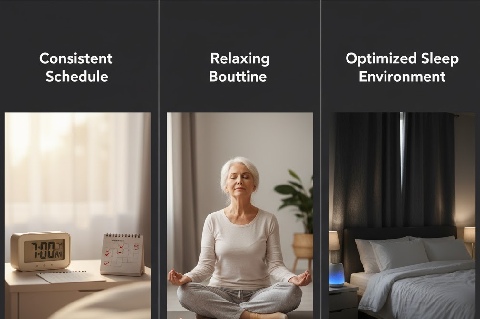Aging is a beautiful journey filled with wisdom, cherished memories, and life experiences, but it also brings natural changes to the body and mind. Staying healthy in later years depends on many factors like balanced nutrition, exercise, and social connections, but sleep is equally vital. How good sleep benefits in the healthy aging process lies in its ability to restore energy, boost memory, and support overall well-being. Yet, among these pillars of wellness, sleep often slips under the radar.
In today’s busy world, sleep is often sacrificed to meet deadlines, family responsibilities, or even late-night entertainment. While younger people may feel they can get by with fewer hours of sleep, older adults face different challenges. Their sleep patterns change naturally with age, and this makes restorative sleep more essential than ever. For healthy aging, both mentally and physically, sleep is as important as food and exercise.
Why Sleep Matters More as We Age
Sleep is not a luxury, it’s a biological necessity that we all need for the betterment of our health. During those restful hours, the body works hard to recharge, repair, and restore balance. For seniors, good sleep is closely tied to long-term health and overall quality of life.

- Restores the body– Deep sleep repairs tissues, muscles, and bones. As we age, the body’s healing processes slow down, so this nightly “repair workshop” becomes even more critical.
- Boosts memory and cognition– Sleep helps the brain process information, organize memories, and maintain sharp thinking. Poor sleep-in older adults have been strongly linked to cognitive decline and memory loss.
- Supports emotional well-being– Seniors who enjoy restful sleep are less prone to mood swings, depression, or anxiety. A good night’s sleep fosters emotional balance and resilience.
- Strengthens immunity– A well-rested body fights infections more effectively and lowers inflammation, which is essential for preventing chronic age-related diseases.
- Promotes longevity– Studies consistently show that people who get quality, restorative sleep live healthier, longer lives. Sleep is truly a pillar of graceful aging.
Good Sleep Benefits in Healthy Ageing Process
The good sleep benefits in healthy ageing process show why rest is essential for long-term health and vitality. Quality sleep boosts brain function, strengthens immunity, and keeps emotions balanced. It helps the body heal, restores energy, and promotes a positive mindset. When older adults prioritize sleep, they feel more active, independent, and content in their daily lives.
How Sleep Patterns Change with Age
In your family, you have noticed that older family members go to bed early and wake up at dawn; you’re not imagining it. Aging naturally shifts the body’s sleep rhythms.

- Circadian rhythm changes– Our internal body clock shifts forward with age, making us feel sleepy earlier in the evening and awake earlier in the morning.
- Less deep sleep– The portion of restorative deep sleep decreases, causing lighter rest and more frequent awakenings.
- More health disruptions– Conditions such as arthritis, sleep apnea, or restless leg syndrome often interfere with sleep cycles.
- Medication side effects– Many seniors take medications that disrupt sleep or cause insomnia.
These changes don’t mean older adults need less sleep, most still require around seven to eight hours. But getting that deep, quality rest can be more challenging.
Consequences of Poor Sleep in Older Adults
The effects of poor sleep go far beyond daytime drowsiness. For seniors, lack of quality rest can significantly impact both health and independence.
- Cognitive decline– Chronic sleep deprivation is linked to memory problems, confusion, and a higher risk of Alzheimer’s disease or dementia.
- Weakened immunity– Poor sleep reduces the body’s ability to fight off infections and slows recovery from illness.
- Higher risk of falls– Daytime sleepiness and reduced alertness increase the chances of accidents, which can be particularly dangerous for older adults.
- Emotional challenges– Sleep-deprived seniors are more likely to experience irritability, depression, and loneliness.
- Cardiovascular problems– Sleep plays a vital role in regulating blood pressure and supporting heart health, both of which are critical in older age.
Tips for Improving Sleep in Older Age
The good news is that sleep quality can be improved at any age. A few intentional lifestyle changes can make a significant difference:

- Maintain a Consistent Schedule
Go to bed and wake up at the same time daily, even on weekends. This consistency trains the body’s internal clock. - Create a Relaxing Bedtime Routine
Light stretching, meditation, or listening to calming music helps signal the body it’s time to wind down. - Optimize the Sleep Environment
A comfortable mattress, cool room temperature, and minimal noise or light improve rest. Blackout curtains or white-noise machines can also help. - Limit Caffeine and Alcohol
Coffee, tea, and alcohol can disrupt sleep when consumed late in the day. Opt for soothing herbal teas like chamomile in the evening. - Stay Active During the Day
Activities like walking, yoga, or light aerobics promote deeper sleep. Just avoid vigorous exercise right before bedtime. - Manage Health Conditions
Seek medical advice for issues like sleep apnea, chronic pain, or anxiety. Treating these conditions often leads to dramatically better sleep. - Use Technology Mindfully
The blue light from phones and TVs interferes with melatonin production. Avoid screens at least an hour before bedtime.
The Mind-Body Connection of Sleep and Aging
Sleep is more than physical rest; it acts as nourishment for the mind. Older adults who get sufficient sleep report:
- Higher levels of happiness and life satisfaction
- Stronger focus, concentration, and social engagement
- Lower stress and anxiety levels
- Better emotional balance and resilience
A well-rested mind is better equipped to stay positive, maintain relationships, and enjoy life’s later years fully.
Sleep as Preventive Medicine
Sleep acts as preventive medicine, just as regular exercise reduces the risk of chronic illnesses; consistent quality sleep helps protect against heart disease, diabetes, obesity, and dementia. It’s not just about sleeping longer but sleeping better. Deep, restorative sleep forms the foundation of long-term health and good sleep benefits in the healthy aging process.
Conclusion
Aging gracefully is not just about eating right or staying active; it’s about holistic well-being, and at the heart of it lies quality sleep. How good sleep benefits in the healthy aging process is seen in its ability to restore energy, sharpen memory, and balance emotions. For seniors, every night of restful sleep strengthens independence, health, and happiness. Sleep is not a luxury, it’s a necessity for a healthier, brighter tomorrow.




